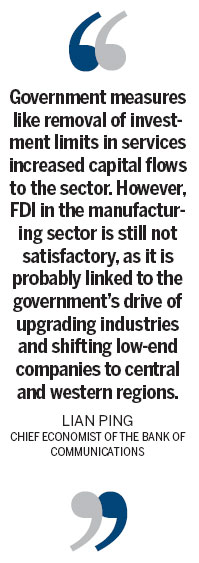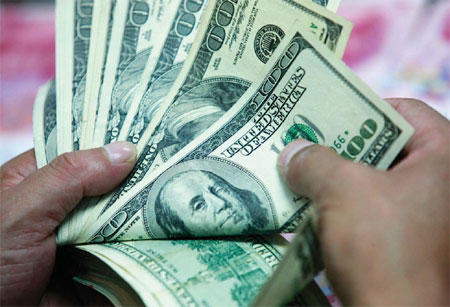Prescription for sound growth
Updated: 2013-08-30 10:01
By Li Jiabao (China Daily)
|
|||||||||||
|
Foreign direct investment inflows to China picked up during the first seven months due to foreign investors' resumed confidence in China's economy. Xie Zhengyi / for China Daily |

Rising FDI flows indicate that foreign investment pipeline is still robust in China
Foreign direct investment inflows into China surged during the first seven months of the year on the back of improved economic confidence in Europe and renewed optimism on China's economic growth prospects, experts say.
"FDI from the European Union to China had declined considerably in the past. However, FDI has witnessed a strong rebound during the first six months of this year," says Li Gang, a researcher from the Chinese Academy of International Trade and Economic Cooperation, a government think tank.
"The EU has returned to economic growth, albeit at a slower pace, during the first six months. This has boosted the confidence of transnational enterprises. China continues to be the magnet of investment among emerging economies due to its higher return on investment. The RoI in the other nations of the 28-member bloc still remains low," Li says.
China's FDI from the EU increased 16.72 percent year-on-year in the first half of this year to $4.64 billion, a pace much higher than China's overall FDI inflow, which rose 7.09 percent year-on-year in the same period, according to the Ministry of Commerce. In contrast, the EU's spending in China dropped 3.8 percent year-on-year last year.
"Renewed EU investment in China will act as a trigger for higher FDI inflows, as several leading European economies like Germany and France are expected to clock higher growth rates," Li says.
During the January-July period, German spending in China jumped 58.25 percent year-on-year to $1.52 billion, while that from France gained 10.09 percent year-on-year to $577 million in the same period, according to the ministry.
FDI inflows into China extended their surge momentum in July, which further reinforced growth stabilization in the world's second largest economy along with the recent economic indicators. China's FDI inflows rose 24.13 percent from a year earlier to $9.41 billion in July, the largest expansion since March 2011 and also the sixth consecutive monthly increase since February, according to the ministry. The data, however, did not include incoming investments in the banking, securities and insurance sectors.
"What's important, is that FDI surges in June and July are in line with the growth momentum since February, which in turn shows the strong optimism that global investors have in China, particularly in the services sector," Shen Danyang, spokesperson of the commerce ministry said during a recent media briefing.
Shen added that the surges were related to investors' parking large amount of funds in big projects in June and July as well as the low base amounts of last year. "It's not sure whether FDI will maintain the same growth pace in the subsequent months," Shen says.
June saw FDI into China surge 20.12 percent year-on-year, the fastest in more than two years, to $14.39 billion. Last year, China's FDI dropped for the first time since 2009, down 3.7 percent from a year earlier to $111.72 billion, according to the ministry.
In the first seven months of this year, FDI from 10 Asian nations and regions went up by 7.7 percent year-on-year to $61.74 billion, including a 55.2-percent rise from South Korea, and a 612.6-percent rise from Thailand. Meanwhile, investment from the United States increased 11.44 percent to $2.18 billion in the January-July period.
After annual economic growth slowed to 7.5 percent in the April-June period from 7.7 percent in the previous three months, signs of stabilization were reinforced in China's economy as the August 22 HSBC Purchasing Managers' Index, a gauge of the activity of China's vast manufacturing sector, rose to 50.1 in August, a four-month high, from July's final reading of 47.7. A reading above 50 indicates expansion of the sector. China's foreign trade rebounded in July owing to recent trade facilitation measures and improvement in the global economy.
China on August 22 approved the Shanghai free-trade zone, which is part of Premier Li Keqiang's drive to open up the economy to sustain growth and is expected to attract foreign companies. Some laws on foreign investment will be suspended in the new pilot free trade zones including Shanghai.
"The FDI increase showed that the growth concerns of global investors have eased" and "also point to their robust confidence in China's economic prospects," says Lian Ping, chief economist of the Bank of Communications.
The services sector saw a steady growth in FDI during the first seven months to $35.64 billion, up 15.78 percent year-on-year, and accounted for 49.93 percent of the total FDI inflows during the period. FDI in China's manufacturing sector declined 2.42 percent year-on-year in the same period, accounting for 41.18 percent of the total, according to the ministry.
"Government measures like removal of investment limits in services increased capital flows to the sector. However, FDI in the manufacturing sector is still not satisfactory, as it is probably linked to the government's drive of upgrading industries and shifting low-end companies to central and western regions," Lian says.
He adds that for the full year, FDI in China may grow by more than 5 percent owing to the improved FDI policies, the new leadership's reforms and further opening of the services sector. But the annual growth this year still may not be in double-digits, Lian says.
Huo Jianguo, president of the Chinese Academy of International Trade and Economic Cooperation, feels that foreign direct investment in China will "grow steadily this year".
"China should enlarge the investment catalogue in the manufacturing sector and bring new capital to the high-end and strategic emerging industries while further opening the services sector," Huo says.
Despite the FDI surge in recent months, Jiang Chao, chief analyst for the debt market at Haitong Securities, remains cautious as the US plans to reduce quantitative easing gradually, a step that will see more capital exiting emerging markets.
With the fundamentals for China's economic recovery not that solid over the long term, fast FDI growth will probably not be "sustainable" in the long run, Jiang says.
During the first seven months of the year, Chinese investment in overseas non-financial sectors rose 20 percent year-on-year to $50.6 billion, according to the ministry. Investment in the US jumped by 278 percent year-on-year while that in the EU surged by 74 percent during the same period.
lijiabao@chinadaily.com.cn
(China Daily European Weekly 08/30/2013 page21)
Today's Top News
List of approved GM food clarified
ID checks for express deliveries in Guangdong
Govt to expand elderly care
University asks freshmen to sign suicide disclaimer
Tibet gears up for new climbing season
Media asked to promote Sino-Indian ties
Shots fired at Washington Navy Yard
Minimum growth rate set at 7%
Hot Topics
Lunar probe , China growth forecasts, Emission rules get tougher, China seen through 'colored lens', International board,
Editor's Picks

|

|

|

|

|

|






